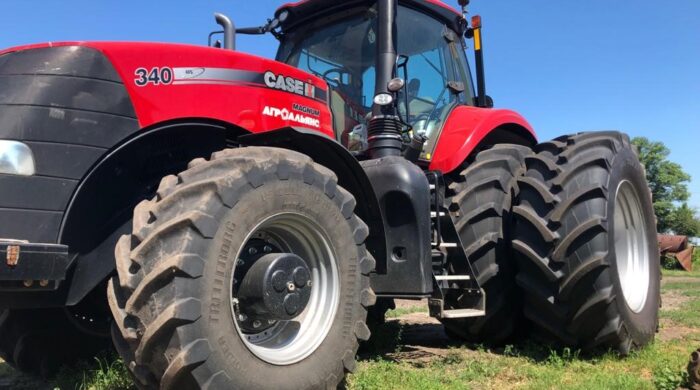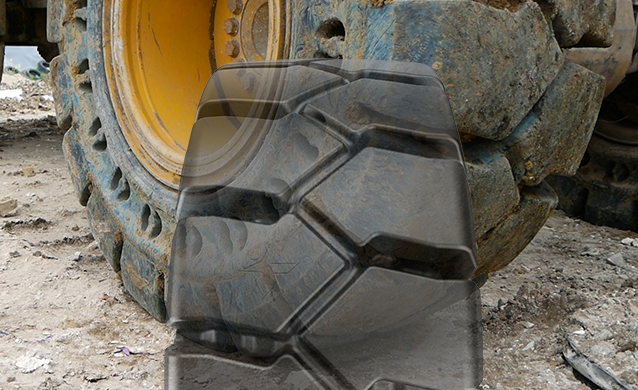How weather extremes affect construction tire maintenance
February 27, 2024
In addition to tread and reliability, contractors should consider the weather conditions and extremes of the seasons when selecting tires. In this article, we’ll be discussing seasonal tire maintenance, the importance of tire pressure and how it fluctuates with weather, and how to maximize tire health prior to seasonal change.
Here are some of the frequently asked questions and challenges a lot of construction sites face.
- One tire can’t handle all seasons and extremes.
Of course, you would want your 19.5 24 backhoe tires to handle all seasons and extremes. Here are some attributes to consider when selecting the best tires for construction sites:
- Applications and the extremes: Are you moving snow somewhere in a cold climate and then landscaping during the summer? Are you in a metal recycling yard where you will have multiple flats?
- Do you need traction?
- Do you need flat and impact protection?
- What is the surface condition: snow and ice? Soft soil? Compacted surfaces? Solid surfaces?
Sometimes, that best tire for your construction sites might not be a tire, maybe it’s a rubber track.
- The beginning of the construction season is the most impactful time to check your construction tires.
After your machines have been in storage, you may think they are ready to go since they have been serviced. However, sometimes the tires are often overlooked as they lose air during idle time in off-season, especially during the cold winter months. Operators are ready to head to work and the tires are the last thing checked or checked at all.
- What are some winter hazards that affect construction tire’s health?
- Cold temperatures: This means a decrease in air pressure. For every time the ambient temperature drops 9-10 degrees, the tire will lose 1psi. Tires can lose pressure overnight and may be underinflated at the beginning of the day. Underinflated tires can’t carry the load and dissipate heat. So proper inflation pressures will ensure the tire to perform.
- Hidden obstacles will damage your tires: Striking snow-cover rocks, steel grates and curbs will cause impact damages and destroy your tires.
- Spinning on ice and snow will impact tire life: Spinning creates heat and heat can damage tires, especially an underinflated tire.
- Driving over water covered obstacle will drastically shorten a tire’s life: Wet tires cut more easily and wear faster.
4. How can construction sites minimize winter hazards’ effects and extend their tires’ life?
- Air pressure: Make sure the tire has enough air pressure to carry the load required. Call the manufacturer and get the air inflation table and read it.
- Avoid driving through water: you don’t know what the water is covering.
- Slow down!
- Don’t spin the tires.: whether you’re spinning the tires on ice or spinning the tires to fill the bucket at the pile, spinning causes heat and heat destroys tires.
- What are some summer hazards that affect construction tire’s health?
Summer hazards that affect construction tire’s health are not too different than winter hazards, only change in temperature.
- Watch for unseen hazards, steel in rock or dirt piles, hazards covered by water, driving too fast for the conditions, driving over obstacles at high speeds, spinning tires or anything that contribute to the tire heat buildup.
- Remember that driving at top speed on pavement will increase heat buildup and impact tire life.
- How can construction sites minimize summer hazards’ effects and extend their tires’ life?
- Ensure work area is clean: especially after loading a truck with rock or dirt, don’t leave anything in the path of the machine to run over.
- Air pressure: maintain the correct air pressure for the task at hand and change the air pressure if the load changes.
- Daily pre-shift tire check: if you see the damage, try to repair it.
- What specific tire pressure ranges should I have for off-road construction tires in lower temperatures?
Air pressures are determined by the load that’s being carried and the speed at which those loads are carried. The best practice is to know what the air pressure in the tire needs to be and maintain that pressure. Refer to your manufacturer’s inflation chart and directions.
- What is the importance of the tires’ pressure in summer and what ranges are recommended?
- Tire pressure isn’t determined by seasons by rather knowing the load, the speed at which the load will be carried, then set the air pressure according to these factors.
- Maintain tire pressure daily and use a calibrated and correct pressure gauge.
- Read and follow the pressure recommendations in the operations manual.
- How does the terrain affect tire pressure recommendations in either high or low temperatures?
Terrain will impact speed, and speed affects pressure. Lower speeds allow for lower pressures with the same loads. For example, a 20.5R25 loader tire with a psi of 65 in the tire will allow you to carry 19,300 lbs. at 5 mph. However, at the same pressure, you can only carry 14,300 lbs. at 30 mph. That is a 2.5-ton difference to due speed or terrain.
- Besides pressure, what other health checks should equipment operators make before beginning work in either season?
- Check for cuts and tears on the surface of the tire: Is anything missing? Has a lug torn off?
- Check the bead: run your hand all around where the tire meets the wheel and make sure it’s consistent all the way around.
- Check the valve stem and the core. Is it leaking? Is there a cap on the valve stem? Is it tight? Is the valve stem properly seated on the wheel? All of this can be checked by spraying a little bit of soapy water on the stem. If you see bubbles, you may have a leak.
In essence, as season change, check your construction tire’s tread depths, air pressures, valve stems, cores and caps, and tire damage. If it can be repair, be sure to repair it as soon as possible or replace it. Take the five minutes daily to inspect your construction tires, it will save you thousands of dollars in downtime and repairs.
Listen to this podcast:
Downloads:
Weather Extremes and Construction Tire Maintenance
More Resources
MAXAM Tire is a global leader and manufacturer of specialty tires engineered and custom built specifically for you.
EcoPoint³’s effect on reducing heat buildup
When it comes to forklift tires, heat buildup is a key contributor to tire failure. The lower the heat buildup, the more durable a tire can be.
Read MoreMAXAM on When a Producer Should Replace Their Agricultural Tires
In the agricultural industry, it is how the equipment is utilized or the inherent operational requirements that will affect the tire replacement cycle. As agricultural tires are considered off-road and not US Department of Transportation (DOT) regulated, there are no firm rules to determine when an ag tire absolutely needs to be replaced....
Read MoreWhen should you replace solid OTR tires?
While solid OTR tires require zero maintenance and are built to last much longer than foam filled pneumatics, they still have a certain life span. Although these tires don’t require the maintenance pneumatic off-the-road tires require, MAXAM recommends operations inspect their solid OTR tires every now and then.
Read MoreJoin Our Network
Subscribe to our newsletter to get the latest news, product offerings, and exclusive content straight in your inbox.


